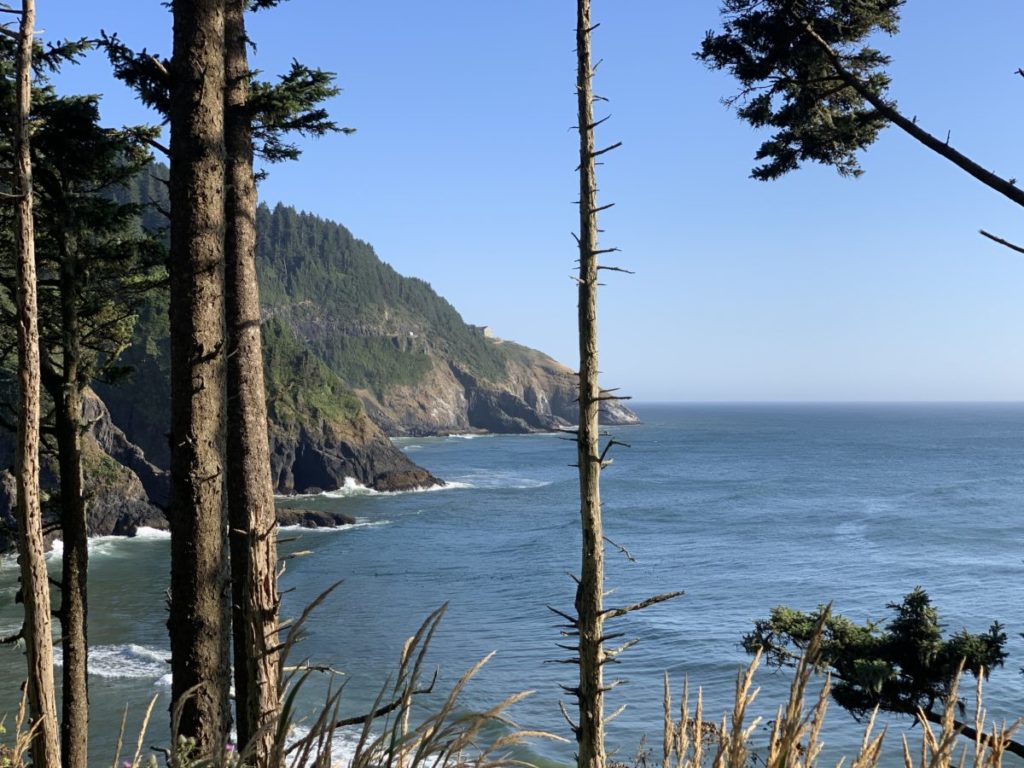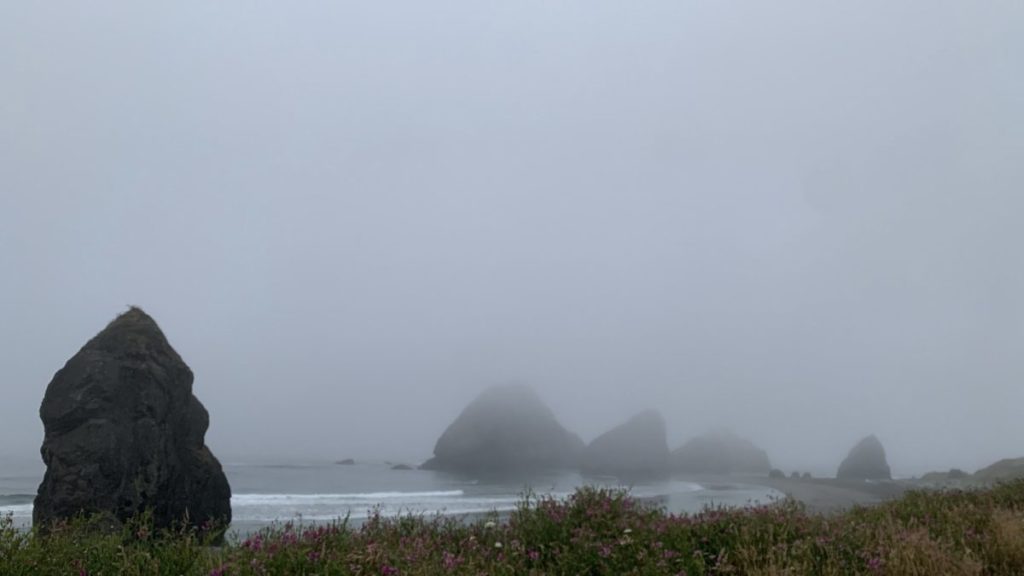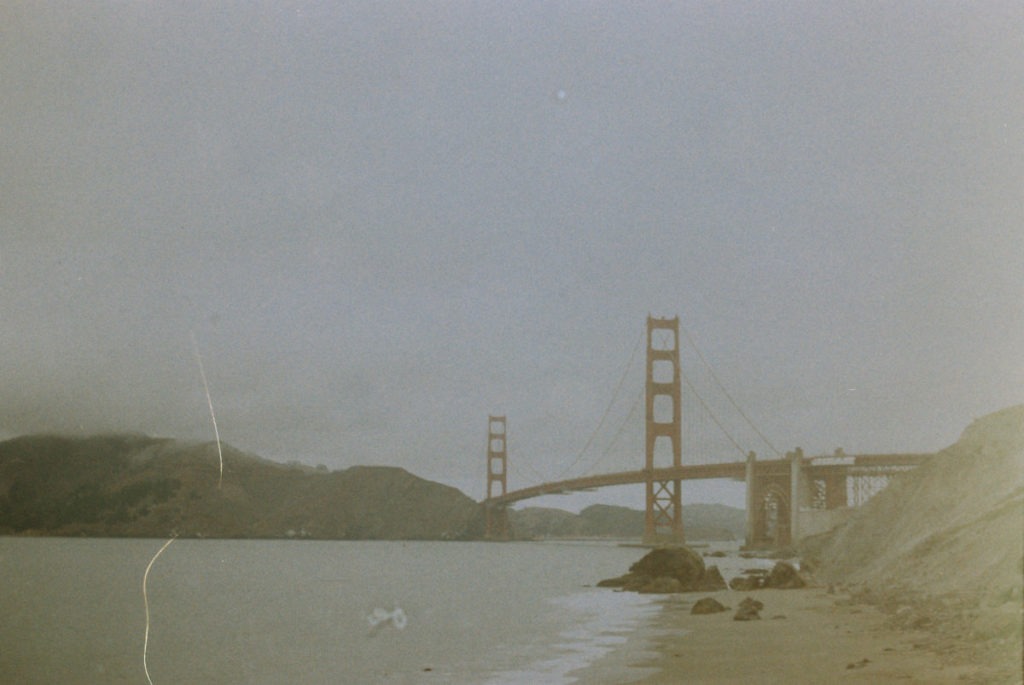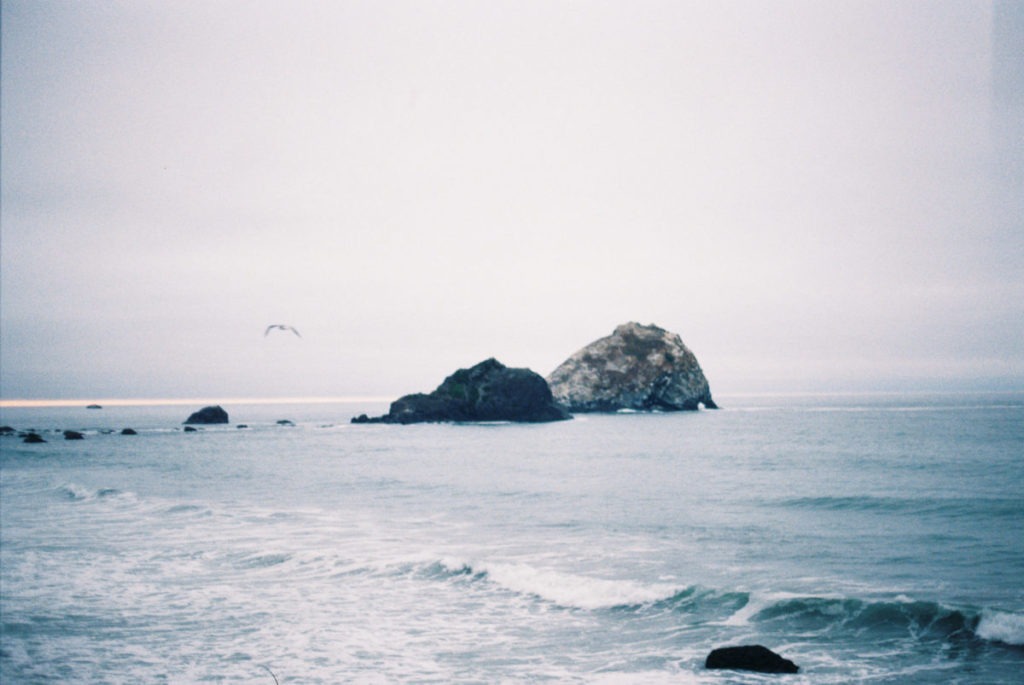Streaks of sunlight falling through redwood branches, the space before me painted deep green, a living breathing landscape. I can still smell the wood and the earth; rich, sweet, wild. I can remember the feeling of presence washing over me. Noticing every fragment of light, the feeling of warm wind breezing through the open window, the sight of a towering ancient forest surrounding me. I was nothing but a small, insignificant human amidst the primordial wisdom of Mother Earth. It’s something I’ve always known, of course. But to feel it; that’s a different story.
While initially planning for my road trip – a solo adventure to Santa Cruz, California – I hadn’t anticipated the expanse of personal transformation I was about to encounter. It was a two-day journey down the Pacific Coast Highway, a couple of nights in an AirBnB tucked in the outskirts of the Santa Cruz Mountains, followed by the two-day drive back to Seattle. This was my first solo travel experience, but I’ve never been one to shy away from solitude. I didn’t think being alone for a road trip would be that much of a change.

So as I set off that morning in early August, surfboard loaded and my bag of road trip snacks serving as co-pilot in the passenger seat. The only thing on my mind was the destination, and my first 12-hour driving day began. I started off strong, riding solely on excitement, some good tunes, and my Topo Chico in the cup holder. But as I made it to my first “leg stretch” of the day, Cannon Beach, Oregon, the allure began to wear away. I still had eight more hours to drive, with another full day after that. The views helped – stunning glances of the Pacific crashing against sea stacks, quaint, run-down coastal towns, and retired lighthouses – but as the day darkened into night, and I was pushing through my last few hours, I realized how utterly alone I was.
When you’re alone, there are usually many easy distractions to reach for: your phone, your T.V., or even a more healthy hobby like reading. You are not truly alone. But when you’re driving for hours on end, with no distractions besides the open road ahead, you learn what it’s like to truly be alone with yourself. At first, it feels like you’re going crazy, especially as the sky around you turns obsidian and you are blinded by opposite headlights in 10-minute intervals. You start to question yourself. Not just why you began this trip in the first place, but your entire existence. And finding a place to sleep for the night is like an alarm bell in your head.
The next morning, I rose groggily from the back of my car. Fueled with some of the shittiest sleep I have ever had, I was revitalized by the sight outside. It was before 6 a.m., and I felt like I was the only person on the planet. It was dead silent, and a thick fog rolled along the coast, blanketing the magnificent sight I wasn’t able to see when I parked the night before: I was right at the edge of a coastal cliff, huge sea stacks rose up out of the water, and vibrant pink flowers studded the ground around me, dampened by the morning fog. All I could do was stand there in awe, and silently thank Oregon for legal overnight parking in national forests.

My second day of driving, mostly through Northern California, was where the reality of presence began to kick in. The discomfort of true isolation was beginning to subside. The more you are forced to sit with yourself and your thoughts, the easier they come and go. I found myself thinking about everything. Everything. Nostalgic childhood moments, regrets, what-ifs, inside jokes with old friends, painful memories. I laughed and cried and probably went through the five stages of grief multiple times. I got to the point where there was nothing more to think of. And suddenly my mind was open – open like I have never experienced before. I saw what was before me, but I didn’t think about what I saw. I noticed everything around me, but it seemingly bypassed my all-scrutinizing mind. I wasn’t a part of that moment in time. I was that moment.
I’ve never had that sense of calm before. A mind completely blank except for the passing awareness of the beauty of the Earth that lay before me. I had never seen Redwoods in person before, and I can vividly recall that feeling of surrender as I passed beneath them. And as I let nothing fill my mind, the hours passed like minutes, and I suddenly found myself in the San Jose traffic guarding the entrance to Santa Cruz.
The Santa Cruz experience, itself? Amazing. Noteworthy in every way possible. But that’s a story for a different time, because as those few days in town came to an end all too quickly, there were another 24 hours of driving awaiting me on my return home.
However, this time I was prepared. I knew the depth of solitude I was about to find myself in. I knew that there was a layer of necessary discomfort to wade through before finding that bliss of presence again. But this time it arrived quicker. Practice makes perfect, you know.

Deep breaths. No distractions. Open road and open sky ahead. It’s an indescribable feeling, presence. Probably because it’s a state of being, rather than something you can feel and express. I cannot give it justice in words. At one point on the drive back to Seattle, I recall turning off all my music and rolling down my car window completely. I was wholly absorbed in the moment around me, noticing, yet not noticing, everything. When I found myself glancing at the time, I was astonished to see hours had passed. I truly thought I had the music off for maybe 30 minutes. Again, the power of presence uprooted my knowledge of anything.
While I try so hard to express the experience of true presence, it is something I cannot simply express through text. I cannot begin to describe the essence of nothing, how it feels to be full yet empty at the same time, how the Earth around you begins to glow. The notion that mindfulness and being present are beneficial isn’t anything new. But I don’t think people understand what actual presence is, due to our existence in a society that requires you to be constantly doing or consuming something. These days, it’s a victory to find even a few hours screen-free. You may think that your daily 10-minute meditation practice or journaling session will do the trick. And while those things are amazing, they aren’t the same. I had four 12-hour days, a total of 48 hours, completely to my lonesome, and I feel I’ve only scratched the surface of what actual presence is supposed to be.
While I don’t think anyone noticed when I returned home, I was different. I had changed in an inscrutable yet significant way. The way that I saw the world around me shifted. I had a calmer mind. The little things that used to stir up anxiety and tension within me dissipated. I realized that life isn’t that complicated. Or rather, it’s too complicated, and the only thing we can do is ebb and flow with the blows it throws our way. My anxiety is most definitely still a part of my life, don’t get me wrong, but a good chunk of my obsessive thoughts and compulsive tendencies had drifted away.
The only thing I can attribute this to is my extended time dropped into presence. I was in full surrender to the world and everything I had gone through, everything I had yet to go through. And the relief of that, the all encompassing feeling of release that conscious awareness brings, changed me.
Maybe I’m a romantic, especially when it comes to nature and finding solace in yourself, but I think that everyone needs to find true respite from our society every so often. We are bombarded day and night, with violent news and FOMO, comparison and numbing entertainment. We have gotten to a point where finding our sense of self, and a sense of what we are on this Earth, is difficult. And because of how hyperaware our society is about every little thing except for our soul, I do think we have to force ourselves into a state of presence.

I unintentionally forced myself into the experience of solitary presence, and I wouldn’t change it for the world. You don’t have to go on a multi-day road trip where you’re sleeping in your car overnight, but do find a way to come home to yourself. Find a way to eliminate distractions, where there’s no ability to even succumb to the temptations of a quick phone check or a chapter of your current read. It won’t be easy, but it’ll be transformative and cathartic in its own lovingly painful way.
The most laughable thing about my whole experience, however, was that I have virtually no pictures of my entire trip. Long story short: I primarily shot film, and my film got exposed to light, and I lost practically everything I had captured that week. While I was quite distraught for a while after this, grieving the loss of all the amazing compositions that I could still see through the viewfinder that will never see the light of day, I have come to see it differently. How perfect. The trip that taught me presence and purpose, only accessible through my memories. But when I close my eyes, and remember that feeling of driving among the redwoods with the smell of Earth in the air and the warmth of the sun on my skin, memories are all I need.
Author

Mo is an alumni of Seattle Central and is currently attending the University of Washington with aspirations to pursue a career in journalism and communications while also delving into anthropology. She aims to explore the world and reveal the stories it wishes to tell through her writing and photography/videography. When she’s not captivated by her journalistic pursuits, she loves to go on adventures, create, watch films, and surf.







Be First to Comment